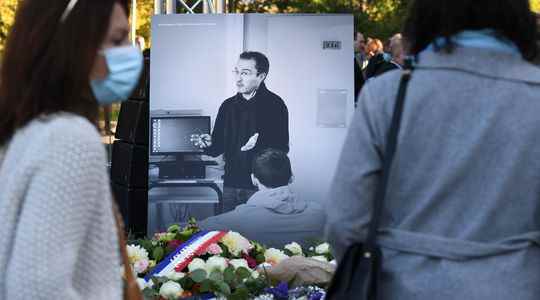Two years later, October 16, 2020 forever marks the history of education. Just as January 7, 2015 forever marked the history of the press, but also that of the police. Two dates which are added to this too long list of tragic moments when obscurantism has shed the blood of anonymous victims whose only crime was, for some, to be there at the wrong time. Others, more explicitly targeted, were condemned to death and savagely executed because of their functions, which were to transmit and defend the most cherished of the values of our democracies: freedom.
Through the execution of Samuel Paty, it is indeed the different forms of freedom that were targeted: the freedom of the pedagogue; the freedom of the journalist, of the cartoonist who have the right to satire, to blasphemy; the freedom of the French citizen who has the right to believe or not to believe in the freedom of the Republic which has freed itself from the dictates of religions; the freedom of a democratic society which has set itself the goal of educating its youth in the universalist values of the Republic and developing the critical spirit of its future citizens.
For me, paying tribute to Samuel Paty means first of all saying loud and clear that National Education must not give in to intimidation. The institution must continue its mobilization and its progress on this oh so difficult ground of the transmission of the values of the Republic, and defend its universalism and secularism, our secularism which is constantly threatened. This march should reinforce and mobilize our teachers, inscribe them in the footsteps of the hussars of the Third Republic to whom Jaurès spoke. This march must not slow down, be less proactive, on the pretext that it disturbs some of the students and their families.
This secularism is demonized by the sirens of demagoguery and Islamo-leftism which leads some teachers, for reasons of personal convictions, to want to adjectivize it. This posture and the self-censorship of some lead, quietly, to make our constitutionally secular Republic a cocktail of subtle communitarian accommodations in the name of individual freedoms and religious pressures.
“An educational emergency”
If we can welcome the decision to train all staff in the values of the Republic within five years, this training will only make sense if it is accompanied by a minimum of adherence by teachers to this principle of secularism which must unite and not divide the teams as in Conflans-Saint-Honorine. Solidarity and strict respect for secularism within establishments are essential conditions for the free exercise of the teaching profession. This confidence in their profession, the teachers will only find it with the unwavering support of their hierarchy, who is responsible for implementing the protection of its agents at the slightest threat. This hierarchy must intensify pedagogical reflection, the production of resources and the allocation of means in order to enable teachers to deal with the protests expressed by certain pupils and their families, amplified by social networks and echoed by extremists of all edges, political, religious or ideological.
Samuel Paty’s fight, which is an educational emergency, must also continue outside of school. This educational emergency stems from societal choices and political priorities. This educational emergency requires the mobilization of all actors, whether they intervene at the level of youth education, within local communities; from the associative world for extracurricular activities; or the world of leisure and sport, popular education, culture. If these universes are easily mobilized, the task becomes much more complex when we talk about the other channels that allow young people to build a system of values: religion, the neighborhood environment and friends, but above all family and social networks. If we can imagine mechanisms for raising awareness and training parents on the problem of the drift of social networks, this can only evolve through a modification of the law and an urgent implementation of regulatory mechanisms by the operators.
Like the climate emergency, the educational emergency requires the mobilization of each citizen who must feel concerned and mobilized, so as to continue, in their own way, Samuel Paty’s fights.
*Bernard Ravet is the author of College Principal or Imam of the Republic (Kero editions, 2017) and co-president of the Licra education network.
